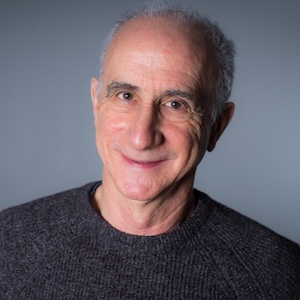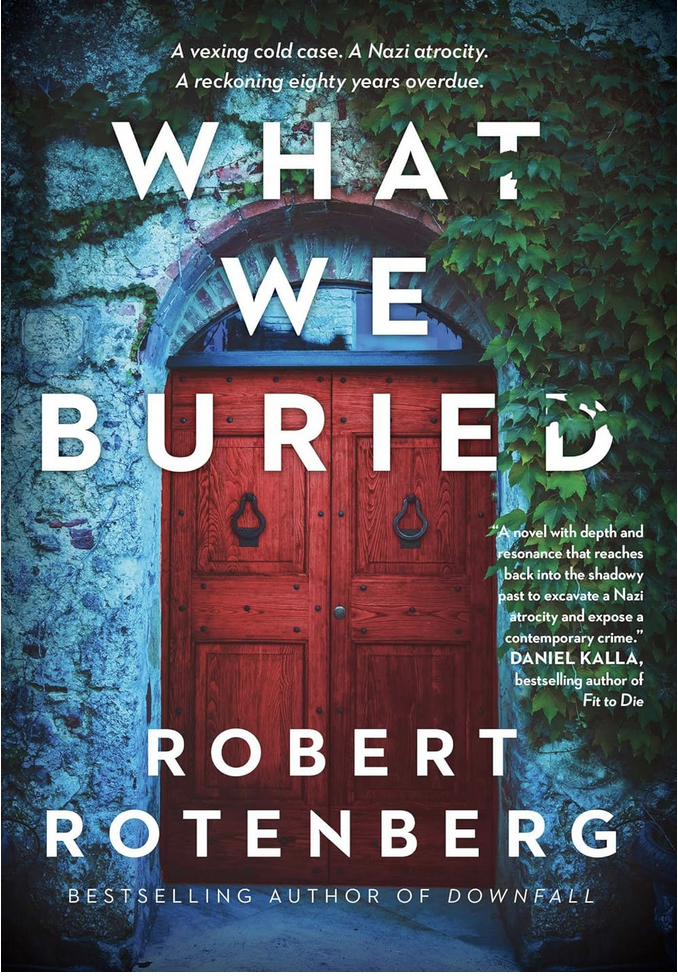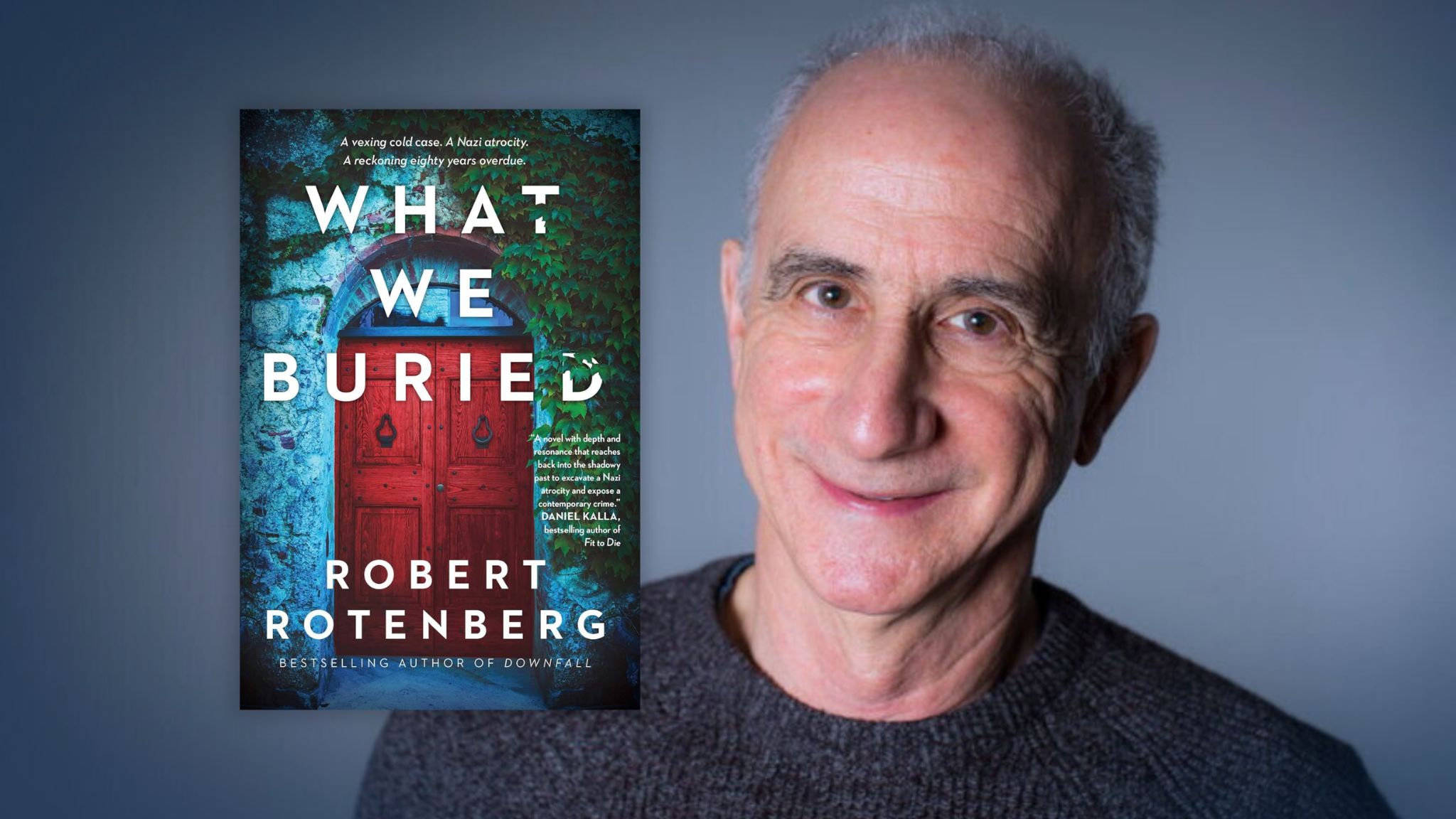What We Buried by Robert Rotenberg
“The war is over for you, but it has never ended for many of us here. We have buried the bodies, not the memories.”
What We Buried (Simon & Schuster), the bestselling seventh Detective Ari Greene novel, by Canadian author Robert Rotenberg dives into two cold cases, dark family secrets and a gruesome event pulled straight from history. From modern Toronto to Nazi-occupied Italy, Rotenberg takes readers on an impeccably researched thrill ride with themes that reverberate through history into the present. You can check out our full review of the book here — and you can read below as we discuss with the author himself all things inspiration, research and how Rotenberg’s experience as a criminal lawyer works its way into his writing.
Q: How did your work in criminal law influence the cold cases in What We Buried?
A: I like to say that being a writer has made me a better criminal lawyer and being a criminal lawyer has made me a better writer. Both are about people. Their secrets. Their flaws. Their true personalities. And both are about story telling. In many ways every criminal case I’ve ever done is a “cold case,” because I’m always digging into the past, peeling back the onion as we like to say. That’s what I did in imaging and writing What We Buried. Except this time, the cold case was an all-too real Nazi massacre of 40 innocent citizens in a remote Italian hill town. A crime of immense proportions that echoes to this day and it was my honor to be able to shed, and keep, a light on it. I think that is why this novel has provoked such an emotional response with my readers.
Q: What inspired you to take the story to historical Italy, and Gubbio in particular?
A: One summer, more than 25 years ago, we were on a trip to central Italy and ended up in Gubbio, a perfectly preserved medieval hill town, amid their 500-year-old crossbow contest. Held in the most beautiful, elevated square in all of Europe, complete with costumed contestants, musicians and flag wavers. This was before I’d written any novels. But I knew one day I had to include this spectacular scene as an opening to a book. In me first novel of the series, Old City Hall, I gave one of my main characters, Daniel Kennicott, a backstory that his older brother Michael was on his way to Gubbio the night he was murdered. For the next five novels, readers kept writing to ask: When will Daniel go back to Gubbio to find out who killed Michael? At last, he has.
Q: In the book’s introduction, you mention that writing it required a lot of research and painful conversations. Tell us more about that process and the experience.
A: My first six novels were legal thrillers, based on my life as a criminal lawyer and the contemporary world of Toronto. In the series, I’ve given my characters rich backstories, especially Detective Ari Greene and his Holocaust-survivor father (and reader favorite) Yitzhak Greene. I’m not the child of a survivors, but most of my friends and my law partner are. For years I’ve talked to their parents, who shared their extraordinary stories. The same with World War II veterans and, for this book, a 98-year-old British woman who was a “morse code” spy. Years ago, I went to the small town in Poland, Ivansk, where my family came from, and where all but two of the Jews were massacred. And I returned to Gubbio 25 years later, met among others a priest who rescued a Jewish family at great risk to himself. The past is not past, as Faulkner said, and I hope it comes alive in this novel.
Q: What We Buried is written so vividly — as a screenwriter, do you imagine your novels playing out like a movie in front of you as you write?
A: Yes and no, and thank you for the compliment. I don’t ever think I’m writing a screenplay. But I see every chapter of my books in my mind, right down the smallest detail. One of the reasons I went back to Gubbio was to walk the streets, day after day. I became Daniel Kennicott, turning right (not left as I’d written in an earlier draft) when he runs from the crossbow contest. To me the drama is the individual amongst the crowd. There’s a great French movie, filmed during the occupation, called Les Enfants De Paradis. In the final climactic scene, the hero is stuck in a crowd desperate to get through. That is the kind of moment I look for. Cinematic? Yes. But even more, compelling drama. William Shakespeare was pretty good at creating vivid scenes as well, and that was a few decades before we had cinema.
Q: Though the book focuses on true events in history, the repercussions of those events linger in the present. What do you hope a modern audience takes away from the story?
A: I’ve never had the kind of response to any of my books that I’ve had with this novel. One example of many. There are many true historic events in the book, one is the brutal Canadian battle against the Germans to liberate Ortona, a coastal Italian town. The fight was in December of 1943. Every time I do a talk, someone puts up their hand and says: their father fought there, their uncle died there. Almost I every day get an email from someone saying the same or telling me a story about their family during and after the war. Fiction, I like to say, let’s us tell the truth in a way that touches and stays with people. So many people thank me for bringing it to life, teaching and entertaining and sustaining. It makes all the hard work writing a novel so very worthwhile.
Q: Are you working on another novel?
A: Just finished it. To be released Feb. 25, 2025. Title: One Minute More. Again, I’m putting my fictional characters in real historic settings. It is 1988. The G-7 Conference is being held in Toronto. This book is a prequel. Readers will see the young Detective Ari Green, sent to the Quebec-Vermont border during a July 4 parade (there’s your vivid cinematic opening scene) on a tip that an assassin in on the way to kill the world leaders. My earlier novels were legal thrillers a la Grisham and Torow, this is an action-packed chase novel à la The Day of the Jackal. Super fun to write and I think to read. “The bath water went cold” my editor said when she read the first draft. Now starting book nine. It’s May 1945, the war is over and Ari Greene’s father Yitzhak is about to meet General Dwight Eisenhower and…
About Robert Rotenberg:
 Robert Rotenberg is the author of several bestselling novels, including Old City Hall, The Guilty Plea, Stray Bullets, Stranglehold, Heart of the City, and Downfall. He is a criminal lawyer in Toronto with his firm Rotenberg, Shidlowski, Jesin. He is also a television screenwriter and a writing teacher. Visit him at robertrotenberg.com or follow him on Twitter @RobertRotenberg and Facebook @RobertRotenberg.
Robert Rotenberg is the author of several bestselling novels, including Old City Hall, The Guilty Plea, Stray Bullets, Stranglehold, Heart of the City, and Downfall. He is a criminal lawyer in Toronto with his firm Rotenberg, Shidlowski, Jesin. He is also a television screenwriter and a writing teacher. Visit him at robertrotenberg.com or follow him on Twitter @RobertRotenberg and Facebook @RobertRotenberg.




